
This inquiry kit features Library of Congress sources and focuses on four of Abraham Lincoln's key speeches.
- Subject:
- Social Science
- Material Type:
- Primary Source
- Provider:
- PBS Learning Media
- Date Added:
- 03/22/2024

This inquiry kit features Library of Congress sources and focuses on four of Abraham Lincoln's key speeches.
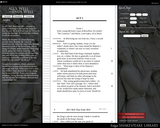
The Folger Shakespeare Library provides the full searchable text of "All's Well That Ends Well" to read online or download as a PDF. All of the lines are numbered sequentially to make it easier and more convenient to find any line.
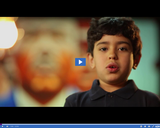
As the country celebrates the birth of one of America’s civil rights leaders, members of the Minnesota community get together and re-tell his famous “I Have a Dream speech. We meet Houston Quilter Kim Ritter whose art is whimsical, ironic and funny. In celebration of their 75th anniversary, The American Ballet Theatre collaborates with filmmaker Ric Burns to present the film “American Ballet Theatre: A History. And we visit the Emerson Burkhart exhibit at the Ohio history center.
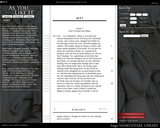
The Folger Shakespeare Library provides the full searchable text of "As You Like It" to read online or download as a PDF. All of the lines are numbered sequentially to make it easier and more convenient to find any line.
This set of lessons extends over several days. Students watch a Prezi and take notes about the classical appeals (ethos, pathos, and logos). Students then read and annotate (focusing on the classical appeals) Winston Churchill's "Be Ye Men of Valour" and Franklin Delano Roosevelt's "Pearl Harbor Address to the Nation." Students work in groups to complete a graphic organizer which helps them analyze the classical appeals in the speeches. Finally, students write an analysis of ethos, pathos, and logos in one of the speeches.
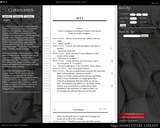
The Folger Shakespeare Library provides the full searchable text of "Coriolanus" to read online or download as a PDF. All of the lines are numbered sequentially to make it easier and more convenient to find any line.
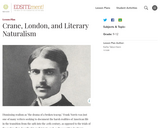
Heavily influenced by social and scientific theories, including those of Darwin, writers of naturalism described"”usually from a detached or journalistic perspective"”the influence of society and surroundings on the development of the individual. In the following lesson plan, students will learn the key characteristics that comprise American literary naturalism as they explore London's "To Build a Fire" and Crane's "The Open Boat."
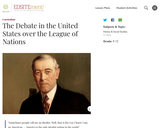
American foreign policy continues to resonate with the issues surrounding the debate over U.S. entry into the League of Nations-collective security versus national sovereignty, idealism versus pragmatism, the responsibilities of powerful nations, the use of force to accomplish idealistic goals, the idea of America. Understanding the debate over the League and the consequences of its ultimate failure provides insight into international affairs in the years since the end of the Great War.
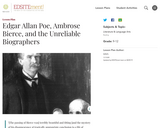
We are naturally curious about the lives (and deaths) of authors, especially those, such as Edgar Allan Poe and Ambrose Bierce, who have left us with so many intriguing mysteries. But does biographical knowledge add to our understanding of their works? And if so, how do we distinguish between the accurate detail and the rumor; between truth and exaggeration? In this lesson, students become literary sleuths, attempting to separate biographical reality from myth. They also become careful critics, taking a stand on whether extra-literary materials such as biographies and letters should influence the way readers understand a writer's texts.
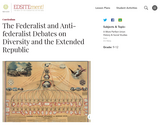
This curriculum unit explores some of the most important arguments of those opposing or supporting the ratification of the U.S. Constitution.

This is a facsimile of George Washington's First Inaugural Speech in 1789.

In this resource, students will engage with video clips that introduce students to the Gettysburg Address, highlight students of The Greenwood School analyzing the speech, and discuss the road to the Battle of Gettysburg and its impact on the war. Students will interact with these videos to learn about the Battle of Gettysburg and the significance of the Gettysburg Address. After viewing the curated clips, students will craft their own presentations analyzing the historical significance of a specific section of the Gettysburg Address with the goal of explaining to their peers what this section meant and why it is important.

A recording and transcript of Martin Luther King Jr.'s celebrated "I Have a Dream" speech, delivered on Aug. 28, 1963, on the steps of the Lincoln Memorial.

The goal of this inquiry is to help students develop their thinking in terms of continuity and change through learning about US immigration policy actions and their effects over time. By examining whether there is anything new about current immigration policy debates, students compare and contrast the discourse around immigration at three key moments in US history—the passage of the Chinese Exclusion Act of 1882, the Immigration Act of 1924, and the Immigration Act of 1965—with the current immigration policy. Students need to develop a deep understanding of each of the three policies in order to write a thoughtful argument that analyzes continuities and changes in perceptions of and policies regarding immigration throughout the post–Civil War period of US history
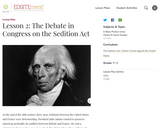
What provisions in the U.S. Constitution are relevant to the debate over the Sedition Act? For this lesson, students will read brief excerpts from actual debates in the House of Representatives as the legislators attempted to work with the version of the bill "Punishment of Crime" (later known as the Sedition Act) already passed by the Senate.
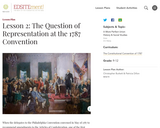
When the delegates to the Philadelphia Convention convened in May of 1787 to recommend amendments to the Articles of Confederation, one of the first issues they addressed was the plan for representation in Congress. This lesson will focus on the various plans for representation debated during the Constitutional Convention of 1787.

Patrick Henry's impassioned plea at the Second Virginia Convention in 1775, "Give me liberty or give me death," defined the American Revolution. This one-hour documentary-drama captures this seminal moment in American history by balancing experts' commentary on the events preceding the Second Virginia Convention with dramatic re-enactments of the historic moments that followed.
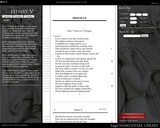
The Folger Shakespeare Library provides the full searchable text of "Henry V" to read online or download as a PDF. All of the lines are numbered sequentially to make it easier and more convenient to find any line.
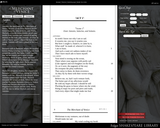
The Folger Shakespeare Library provides the full searchable text of "The Merchant of Venice" to read online or download as a PDF. All of the lines are numbered sequentially to make it easier and more convenient to find any line.
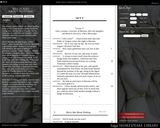
The Folger Shakespeare Library provides the full searchable text of "Much Ado About Nothing" to read online or download as a PDF. All of the lines are numbered sequentially to make it easier and more convenient to find any line.